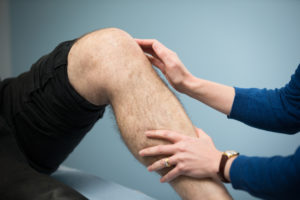 New research by a team at the University of Oxford, supported by the NIHR Oxford Biomedical Research Centre, provides a robust basis for informed shared decision-making and consent on keyhole knee surgery.
New research by a team at the University of Oxford, supported by the NIHR Oxford Biomedical Research Centre, provides a robust basis for informed shared decision-making and consent on keyhole knee surgery.
An innovative study, published today in the Lancet, using 20 years’ worth of data covering around 700,000 arthroscopic partial meniscectomies (APM), or keyhole knee surgery, looked at the risks from the procedure when compared to the general population, to inform the conversations between clinicians and patients affected by meniscal tears.
More than 30 per cent of people over the age of 50 have meniscal problems. This rises to over 60 per cent for individuals with osteoarthritis. APM is one of the most commonly performed orthopaedic procedures worldwide for these problems and recent research has raised concerns both about its effectiveness and potential for complications.
The Oxford team, based at the Nuffield Department of Orthopaedics, Rheumatology and Musculoskeletal Sciences (NDORMS), showed that whilst very rare, serious complications such as pulmonary embolism and infection can arise following APM, which should limit the procedure to carefully selected patients.
Professor Andrew Price, lead investigator on the project and president of the British Association for Surgery of the Knee, said: “We have recently made great steps forward in understanding who will benefit from arthroscopic meniscal surgery. It is also critical to assess the potential risks of these procedures. Our aim was to improve the information available for patients and clinicians to enhance the shared decision making process.”
The research looked at around 700,000 procedures in England using data from the National Health Service and Office for National Statistics databases in England for the last 20 years. In addition to the volume of data, the team took an innovative approach to data analysis.
“By comparing the rate of each potential adverse outcome occurring following APM with the frequency of that outcome occurring in the general population, our findings enable patients and clinicians to understand, for the first time, the true risk that can be attributed to undergoing this common surgical procedure,” added Simon Abram, first author of the paper published today.
Shared decision-making is an important aspect of improving healthcare in the NHS, where patients and clinicians work together to decide on treatments and approaches which best suit an individual’s circumstances. This process puts people at the heart of decisions about their own care, empowering patients and carers and fostering meaningful conversations with the health professionals involved.